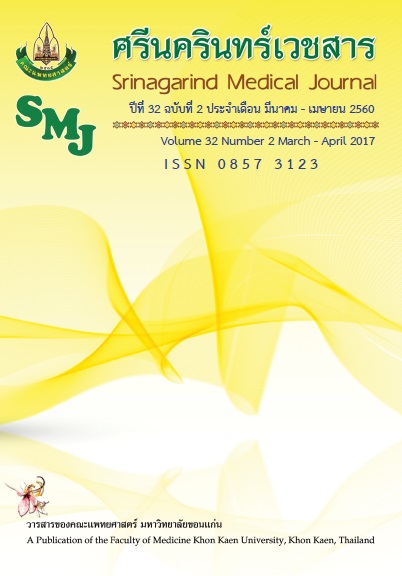Impact of Antibiotic Smart Use Program on Antibiotic Dispensing knowledge of Nurse Practitioners in Khon Kaen Health Promoting Hospitals
Abstract
Background and Objective: Rational use of antibiotics is a global concern and the quality of the knowledge of the health care provider is a key influencing factor. This study was conducted to evaluate the impact of Antibiotic Smart Use (ASU) program, organized by the Thailand Ministry of Public Health, on the antibiotic dispensing knowledge of nurse practitioners working at health promoting hospitals (HPHs) in Khon Kaen province, Thailand.
Methods : Questionnaires with scenarios for treatment of upper respiratory diseases, acute diarrhea in children and open wound with bleeding were sent to 294 nurse practitioners at Khon Kaen HPHs. The dispensing of antibiotics was appropriate if antibiotics was dispensed for the open would with bleeding scenario but not for the other scenarios. The appropriate dispensing between the dispensers who attended the ASU workshop and the non-ASU attendances were compared using Fisher’s Exact Test and p< 0.05 was defined as the significance level.
Results : A total of 95 (32.31%) questionnaires were returned and data could be retrieved from 92 completed questionnaires (31.29%). Of the 92 respondents, 75 returned the appropriate dispensing response for all three scenarios (81.52%). Ten inappropriate responses were returned for upper respiratory disease(10.87%), one for acute diarrhea in children (1.09%) and six for open would with bleeding (6.52%). Attendance at the ASU workshop was associated with providing the appropriate treatment responses (60 ± 88.24%) VS 15 ± 62.5%), p < 0.05).
Conclusions : Most of nurse practitioners at KhonKaen HPHs have sufficient knowledge in dispensing antibiotics for treatment of upper respiratory diseases, acute diarrhea in children and open wound with bleeding. Attendance at an Antibiotic Smart Use (ASU) workshop could improve the appropriate dispensing.
ผลของโครงการ Antibiotic Smart Use ต่อความรู้เกี่ยวกับการจ่ายยาปฏิชีวนะของพยาบาลที่ปฏิบัติงานในโรงพยาบาลส่งเสริมสุขภาพตำบลจังหวัดขอนแก่น
หลักการและวัตถุประสงค์ : ความสมเหตุสมผลในการใช้ยาปฏิชีวนะเป็นประเด็นสำคัญทั่วโลกและความรู้ของบุคลากรที่ให้บริการด้านสุขภาพเป็นหนึ่งในปัจจัยที่มีผลต่อการเลือกใช้ยาปฏิชีวนะ การศึกษานี้มีวัตถุประสงค์เพื่อศึกษาผลของโครงการ Antibiotic Smart Use (ASU) ที่มีต่อความรู้ในการจ่ายยาปฏิชีวนะของพยาบาลประจำโรงพยาบาลส่งเสริมสุขภาพตำบล (รพ.สต.) ในจังหวัดขอนแก่น
วิธีการศึกษา : ส่งแบบสอบถามที่กำหนดสถานการณ์จำลองโรคทางเดินหายใจส่วนบน ท้องร่วงเฉียบพลันในเด็ก และแผลเลือดออกทั่วไป จำนวน 294 ฉบับ ให้แก่พยาบาลประจำ รพ.สต.จังหวัดขอนแก่น เพื่อให้อธิบายวิธีรักษาในโรคดังกล่าว ทั้งนี้กำหนดว่าเป็นการจ่ายยาเหมาะสมเมื่อจ่ายยาปฏิชีวนะในสถานการณ์แผลเลือดออกทั่วไปและไม่จ่ายยาปฏิชีวนะสำหรับโรคทางเดินหายใจส่วนบนและท้องร่วงเฉียบพลันในเด็ก ทำการเปรียบเทียบความเหมาะสมในการจ่ายยาระหว่างกลุ่มที่เคยอบรมในโครงการ ASU และไม่เคยอบรมโดยใช้สถิติ Fisher’s Exact Test และกำหนดว่ามีนัยสำคัญทางสถิติเมื่อ p <0.05
ผลการศึกษา : จากแบบสอบถามที่สมบูรณ์ 92 ฉบับ (ร้อยละ 31.29) พบว่ามีการจ่ายยาเหมาะสม 75 ราย (ร้อยละ 81.52) จ่ายยาไม่เหมาะสมในสถานการณ์โรคทางเดินหายใจส่วนบน 10 ราย (ร้อยละ 10.87) แผลเลือดออกทั่วไป 6 ราย (ร้อยละ 6.52) และโรคท้องร่วงเฉียบพลัน 1 ราย (ร้อยละ 1.09) ผู้ที่เคยอบรมในโครงการ ASU เลือกจ่ายยาเหมาะสมมากกว่าผู้ที่ไม่เคยอบรม 60 ราย (ร้อยละ 88.24) และ 15 ราย (ร้อยละ 62.5), p < 0.05)
สรุป: พยาบาลส่วนมากที่ปฏิบัติงานที่ รพ.สต.จังหวัดขอนแก่น มีความรู้ในการจ่ายยาปฏิชีวนะในโรคทั้งสามระบบดังกล่าว และการอบรมในโครงการ ASU สามารถเพิ่มความรู้ส่วนนี้ได้




